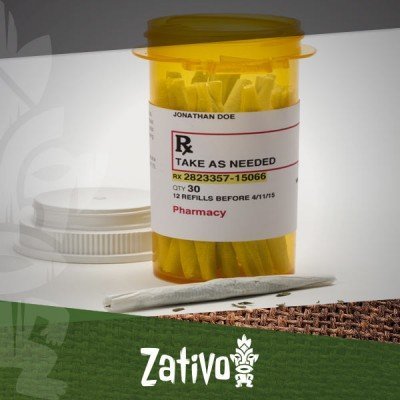Don't have an account?
Register NowYou have to add to cart at least 5 bottles or any program to make checkout.
- BlogA Look at Cannabis as a Painkiller
A Look at Cannabis as a Painkiller
Published: August 12th, 2016
Categories:
Medical Cannabis
Chronic pain is hard to treat. In fact, if you talk to an actual pain doctor, they'll quickly tell you they can't cure your pain; all they can do is help you manage it. For years, the first line of defense against pain has been opiate medications, but as a result, opiate addiction and related deaths are growing at astounding rates.
Could cannabis be just as effective? Or even help people beat addiction? Let's take a look and see:
CANADA SAYS 3 PUFFS DAY CAN EASE NERVE PAIN
Injuries or surgical error can damage nerves resulting in neuropathic pain. When this happens, the nerves go haywire and continue to send pain signals to the brain without any external stimulus. Neuropathic pain is very individual, but for most sufferers, it is fairly constant and can feel like burning, stabbing, aching, or tingling.
A team of Canadian researchers at a Montreal pain clinic knew that a small percentage of their patients used cannabis along with their pain medication with good results, so they decided to scientifically measure the effectiveness. They chose 45 of their patients and randomly rotated them through a placebo plus cannabis with either 2.5%, 6% or 9.4% THC, in addition to their normal meds.
The patients never knew which sample they were smoking at any given time, but they were told to use each one three times a day for five days in a row before moving to the next. Precise smoking instructions were included: inhale one time for 5 seconds, hold for 10, then exhale.
Very few people dropped out of the study, there were practically no side effects, and the difference in the average pain level dropped from 6.1 on a 10 point scale when taking the placebo to 5.4 with the strongest weed.
That doesn't look like a big difference, but if you've ever been in pain, any relief is welcome. The researchers concluded that cannabis does have analgesic (pain relieving) properties, but it would probably be better used as a complementary treatment instead of a complete replacement for traditional painkillers.
ISRAEL REPORTS SIGNIFICANT PAIN RELIEF & INCREASED QUALITY OF LIFE
Israel already allows patients to use cannabis for pain relief, but researchers at the Ben-Gurion University wanted to know if cannabis improved the overall quality of life for pain patients.
They chose over 2,000 cancer and non-cancer patients who used cannabis to relieve their pain and interviewed them over the course of two years. Most (99.6%) had decided to try medical cannabis because traditional medication either didn't work or had terrible side effects. In the end, the researchers found that cannabis did, in fact, make a dramatic difference in the life of the participants.
Cannabis not only reduced the participants' pain but improved their overall mental state plus many of their other symptoms. During the trial, less than 10% of participants stopped using cannabis due to the side effects.
CANNABIS AS AN OPIATE ADDICTION TREATMENT
In 2012, over 26 million people worldwide were thought to have misused opioids on a regular basis or were outright addicted, with accidental overdoses are growing at an alarming rate. Curiously, overdoses are nearly 25% lower in US states that have legalized cannabis compared to those with restrictive policies.
A medical marijuana program called Canna Care Docs in Massachusetts took notice and is now using cannabis to treat addiction to a variety of drugs including opiates, muscle relaxers, and benzos. So far, they have treated over 80 patients by giving them cannabis to manage their symptoms while slowly tapering them off their other medications with about a 75% success rate.
While some would argue that they're only trading one drug for another, no one can deny that cannabis is safer, with fewer side effects and no chance of overdose. If nothing else, this substitution would save lives.
Although California and other states have been unofficially using cannabis to treat both pain and addiction for some time, Maine could be the first state to add heroin and painkiller addiction to the list of conditions that qualify patients to receive medical marijuana.
Over 30 people testified at a recent public hearing in Maine to let government officials know how cannabis had helped them. Most notably were a 23-year-old Britney Lashier, who reported that cannabis helped her overcome a heroin addiction and 50-year-old Joseph Legendre who told of the relief he found in cannabis after 26 years of chronic back pain.
Conclusion
Whether or not researchers or national governments agree, real people just like you and me are using cannabis with great success as either their sole treatment for chronic pain or to reduce the amount of painkillers they need to take. As the research catches up to the anecdotal evidence, we can only hope that this safe, effective medical option will be readily available and legal for all.





